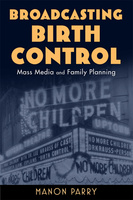Managing Madness in the Community
The Challenge of Contemporary Mental Health Care
American Melancholy
Constructions of Depression in the Twentieth Century
War and Disease
Biomedical Research on Malaria in the Twentieth Century
A massive undertaking, the antimalarial program was to biomedical research what the Manhattan Project was to the physical sciences.
A volume in the Critical Issues in Health and Medicine series, edited by Rima D. Apple and Janet Golden.
Saving Sickly Children
The Tuberculosis Preventorium in American Life, 1909-1970
Tainted Earth
Smelters, Public Health, and the Environment
Thoroughly grounded in extensive archival research, Tainted Earth traces the rise of public health concerns about nonferrous smelting in the western United States, focusing on three major facilities: Tacoma, Washington; El Paso, Texas; and Bunker Hill, Idaho. It documents the response from community residents, public health scientists, the industry, and the government to pollution from smelters and the long road to protecting public health and the environment.
Tainted Earth
Smelters, Public Health, and the Environment
Thoroughly grounded in extensive archival research, Tainted Earth traces the rise of public health concerns about nonferrous smelting in the western United States, focusing on three major facilities: Tacoma, Washington; El Paso, Texas; and Bunker Hill, Idaho. It documents the response from community residents, public health scientists, the industry, and the government to pollution from smelters and the long road to protecting public health and the environment.
The Business of Private Medical Practice
Doctors, Specialization, and Urban Change in Philadelphia, 1900-1940
Health care is more expensive in the United States than in other wealthy nations, and access varies significantly across space and social classes. In this case study, James A. Schafer Jr. uses the city of Philadelphia in the early twentieth-century to show that these problems reflect the informal organization of health care in a free market system in which profit and demand, rather than social welfare and public health needs, direct the distribution and cost of crucial resources.
Classrooms and Clinics
Urban Schools and the Protection and Promotion of Child Health, 1870-1930
Classrooms and Clinics is the first book-length assessment of the development of public school health policies from the late nineteenth century through the early years of the Great Depression. Richard A. Meckel examines the efforts of early twentieth-century child health care advocates and reformers to utilize urban schools to deliver health care services to socioeconomically disadvantaged and medically underserved children in the primary grades to improve children’s health and thereby improve their academic performance.
Broadcasting Birth Control
Mass Media and Family Planning
Traditionally, the history of the birth control movement has been told through the accounts of the leaders, organizations, and legislation that shaped the campaign. Historians have recently begun examining the cultural work of printed media, including newspapers, magazines, and novels in fostering support for the cause. This book builds upon this new scholarship on the women’s reproductive health movement to explore the films and radio and television broadcasts developed by twentieth-century birth control advocates to promote family planning in the U.S. and internationally.
Mapping "Race"
Critical Approaches to Health Disparities Research
The essays in this unique book argue for the inclusion of race as a social construction in the design of large-scale data collection efforts and how scientists must utilize race in the context of specific research questions. This landmark collection concludes on a prescriptive note, providing an arsenal of multidisciplinary, conceptual, and methodological tools for studying race specifically within the context of health inequalities.










